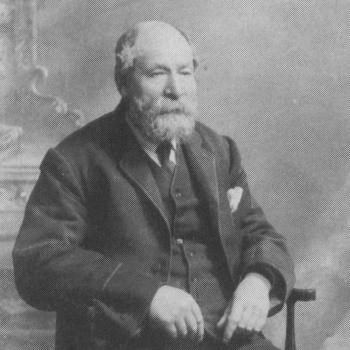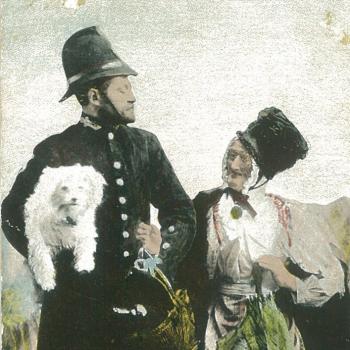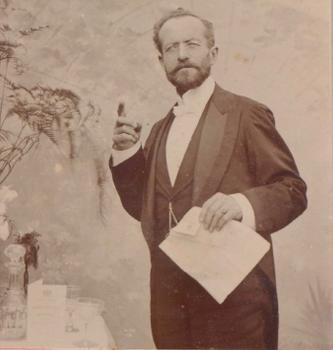25th July 2017
Advocate and friend of Hugo, Alderney's Peter Le Ber was an exceptional young man, who became editor of the Gazette de Guernesey aged only 24. This is part of the Victor Hugo and Guernsey project.
21st April 2017
On 5 March 1862 Hugo made arrangements with his cook, Marie Sixty, for a repas des enfants pauvres to be served every week, ‘the meal will be the same as ours, we shall serve them, they will say as they sit down Dieu soyez beni and on rising Dieu soyez remercié.’ [Carnet, Quatrième agenda, Massin p. 1387.] His son Charles disapproved of the wording (see letter from Hugo to Charles, Massin p. 1388, 22 March 1862). Hugo followed the teaching of a French doctor that meat and a glass of wine were good for growing children—not a medical opinion that would be advocated today. The first such lunch took place on 10 March 1862 and thereafter they were held on a regular basis. There was a special meal at Christmas, when presents were distributed. These were often of a useful nature—items of clothing for example, but there were also toys. This is part of The Victor Hugo and Guernsey project.
8th November 2016
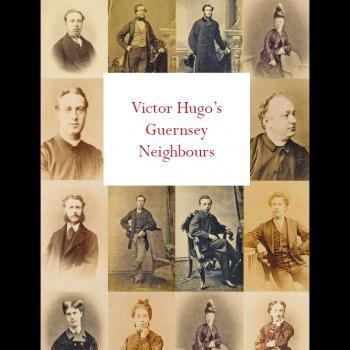
A new digital project based upon the book, Victor Hugo's Guernsey Neighbours, by Gregory Stevens Cox, MBE, MA (Oxon), Ph.D. The publication of the book was timed to coincide with the Victor Hugo in Guernsey Festival which took place in Guernsey in May, 2016. From this festival was born The Victor Hugo in Guernsey Society. The Festival celebrated the 150th anniversary of the publication of Victor Hugo's great novel, Les Travailleurs de la mer, or Toilers of the sea, which with its references to actual people and localities demonstrates a detailed knowledge of and interest in the island, and an understanding and empathy for Guernsey's culture and inhabitants, unparalleled until the publication of G B Edwards' Ebenezer Le Page in 1981. Hugo was not only influenced by Guernsey in writing this novel, however, but absorbed everything around him in his new home, and the legacy of Guernsey can be detected in every aspect of his life and work. The intention of this project, hosted by the Priaulx Library, is that it should collect and examine that island influence, and we welcome any contribution.
25th October 2016
In Guernsey in 1858 Victor Hugo became seriously ill with anthrax. It was apparently after recovering from this near-fatal illness that he was persuaded to grow a beard, as a protection for his throat; the first photograph of him sporting a beard was taken on 5 May 1861 on a visit to Brussels, during his trip to finish Les Misérables. For a while he allowed it to grow luxuriantly, but soon smartened it up and adopted the shorter beard now so familiar from photographs. Above is a portrait of one of Hugo's hairdressers, James Le Gallez, by kind permission of Ann Philippo. This is part of the Victor Hugo and Guernsey project. [By Dinah Bott]
31st May 2016
'You knew old Harry Turner from Mill Street, a funny little man. This is him and his 'Old Guernsey woman.' He has just died. This is him and his effigy of an old Guernsey woman, and his dog Fido.'
21st March 2016
From the Star, March 10 and March 17, 1866.
7th October 2015
A translation of George Métivier's dictionary entry for Guernsey's dread black dog, or Tchîco, p. 461. [By Dinah Bott]
1st June 2015
'Turner may have been a showman, a lover of publicity and maybe an eccentric in some respects. At the same time he had courage, generosity, a sense of kindness and a remorseless hatred for what he considered to be injustice. He was comparatively wealthy, and much of his riches was spent on the less fortunate. We could do with such a man in Guernsey today.' [Guernsey Evening Press, March 9, 1957.] [By Dinah Bott]
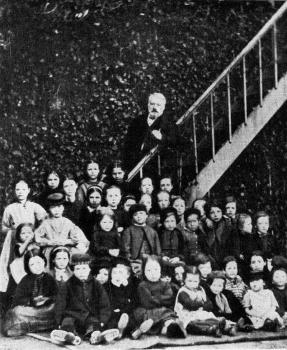
From the Gazette de Guernesey, Saturday 27 December, a report on Hugo's Christmas party for deprived children; a letter from Hugo to his wife, whose idea it all was in the first place; and another to the French publisher Castel, in which he plans to donate the proceeds of a new book of drawings to his poor Guernsey protégés. The editor of the Gazette at this time was Hugo's friend and disciple, Guernseyman Henri Marquand. The photograph accompanying this article is dated 1868. It was taken in March by Arsène Garnier. (Another very similar set of photographs was taken by a Jerseyman with a studio in London, named Henry Frankland, in February 1868; the Library has a photographic plate of one of these iconic images.) This particular photograph was popular with the public at the time; they could buy it in the local shops.Article by Dinah Bott.
From the Star newspaper.


